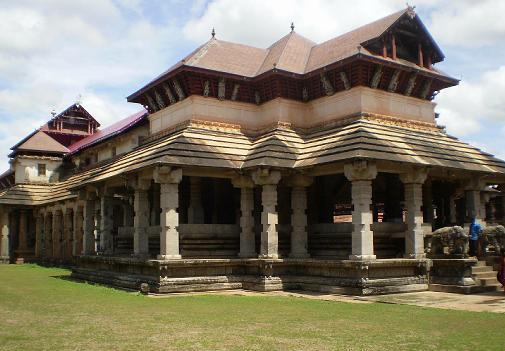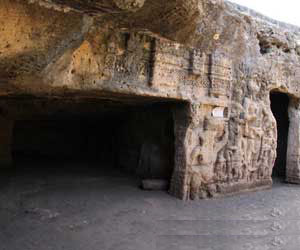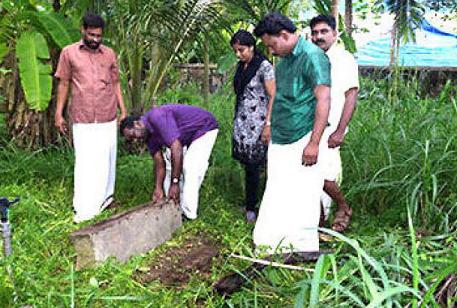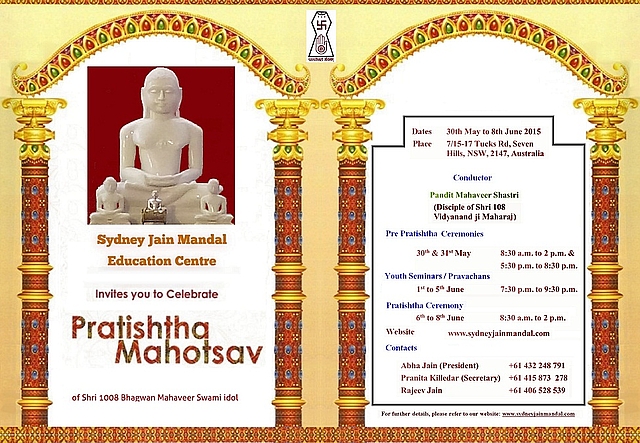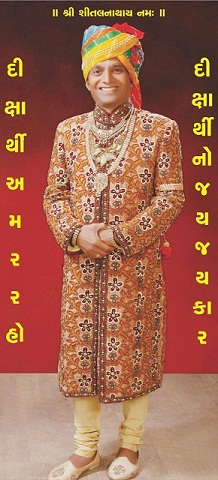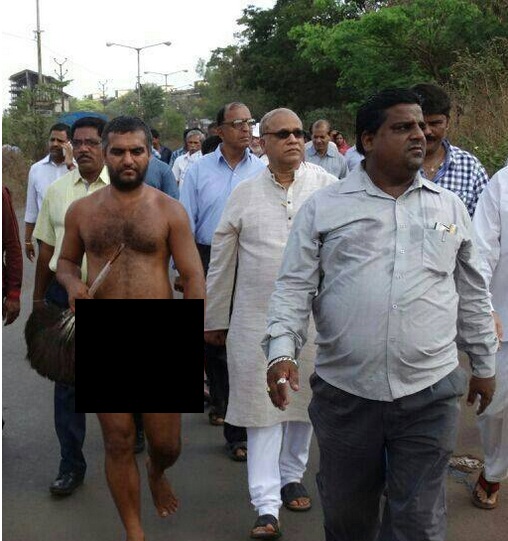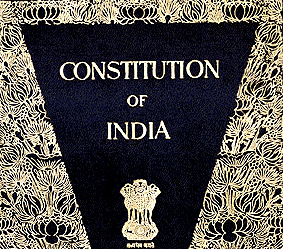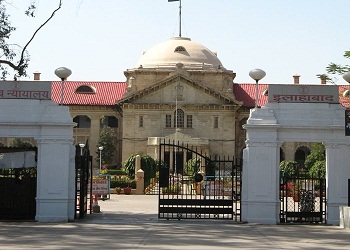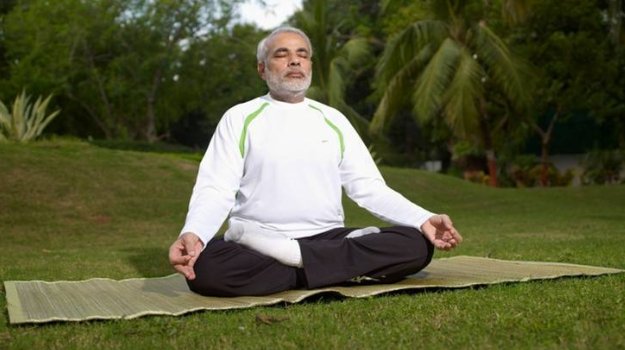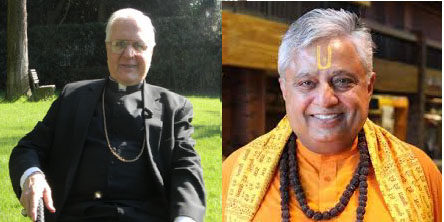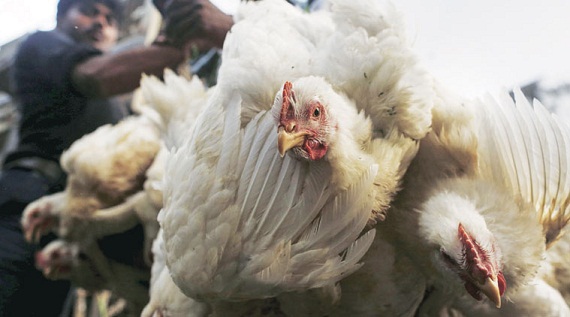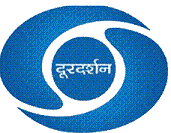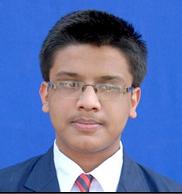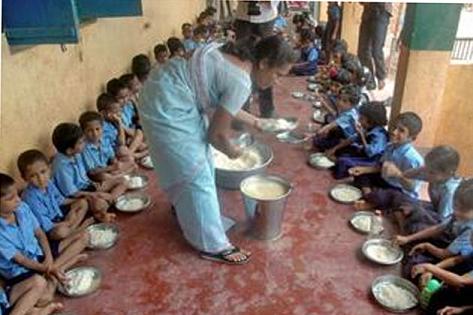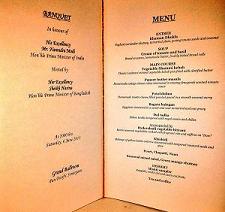 |
TEMPLES
MOODABIDRI: A RICH SOURCE OF ANCIENT JAIN CULTURE
Moodabidri, Situated 37 kilometres away from Mangaluru, it is a picturesque land of hill and dale, a rich culture embedded in maths and jain temples, an agrarian bonanza boasting of the famous Soans Pineapple Farm and the rare herbal garden of medicinal plants of the Alva Ayurvedic College, an educational hub with a cluster of engineering colleges and other educational institutions, the birthplace of Ratnakara Varni, the medieval doyen of Kannada literature and author of Bharatesha Vaibhava.
|
Steeped in Jain culture: Rightly known as the Jain Kashi of South, Moodabidri has the spirit of Jainism echoing in all its streets. It is the most sought after pilgrim centre of the Jains and a fascinating fact is that its rich culture is linked to the number 18 and has 18 roads connecting it to various other villages, 18 lakes and 18 basadis. The 18 Jain basadis that adorn this temple town are Badaga Basadi, Shettara Basadi, Hire Basadi, Belkere Basadi, Koti Basadi, Vikrama Shetti Basadi, Kallu Basadi, Leppada Basadi, Deramma Shetti Basadi, Chola Shetti Basadi, Maday Shetti Basadi, Baikanatikari Basadi, Kire Basadi, Padu Basadi, Shri Mathada Basadi, Jaina Pathashalya Basadi, Guru Basadi and Tribuvana Tilaka Chudamani Basadi. Built in 714 AD, Guru Basadi is the earliest Jain monument of this place and is also called as Siddantha Basadi and Hale Basadi. Lord Parshvanatha, the 23rd Jain Thirthankara is the presiding deity of this Temple and you can find a beautiful 3.5 metre tall statue of his in the sanctum. The rare Jain palm leaf manuscripts of 12th Century AD known as Dhavala texts were discovered here and are preserved reverently till date. During the Mughal invasions, precious Jain texts were smuggled from Shravanabelagola to Moodabidri. Rediscovered in 1800’s, these manuscripts of Prakrit texts copied in Hale Kannada with pin pricks on palm leaves are revered as the oldest written materials of the Jain origin. The collection of three ancient manuscripts - Dhavala, Jayadhavala and Mahadhavala - collectively called the Siddantha in Digambara tradition was the only copy of the Siddantha available for many centuries. The Tribuvana Tilaka Chudamani Basadi or the ‘crest jewel of three worlds’ was built in 1430 AD and is popularly known as the 1000-pillar temple for its intricately carved pillars. Built in Vijayanagara style in solid granite, this structure is considered the largest among Jain basadis. The construction was initiated in 1430 AD and it is said that it took 31 years for its completion. Due to its sheer magnitude, it was constructed in three phases. In the first phase, the sanctum with the 2.5 metre tall idol of Chandranath Swami was installed. In the second phase, the open prayer hall with its 100 pillars was built and last was the installation of the 15-metre- tall single stone pillar called the manasthamba by Queen Nagala Devi of Karkala, right in front of the structure. Moodabidri was also the seat of the Chowtas, a local Jain family originally ruling Puthige, situated 5km from here. They shifted their capital to Moodabidri in the 17th Century and constructed a palace, the remains of which can still be seen. There are beautiful images of Jain thirthankaras, yakshas and yakshis in the basadis. The stucco images in Leppada Basadi are worth a visit. The Jain tombs and the Nyaya Basadi at Kodangallu in the outskirts of Moodabidri and the monolith Bahubali statues in nearby Karakala and Venur will complete the yatra.
FOUR HUNDRED YEAR-OLD JAIN IDOLS FOUND IN JAMNAGAR
Jamnagar: 29th May: Over a dozen idols of Jain 'Tirthankars', estimated to be more than 400-year-old were excavated from a construction site in Chandibazar area of Jamnagar city recently. As many as 14 idols were found buried in the earth when a local builder Bharat Patel was excavating to lay the foundation of his new bungalow. |
REMNANTS OF JAIN TEMPLE FOUND AT MATHILAKOM
THRISSUR: With the completion of the first phase of excavation at Thrikkanamathilakom in Thrissur, there emerged evidence that could possibly justify the existence of a Jain temple rumoured to have endured the 12th century. According to the archaeological team, the evidence regarding the Jain temple is by no means conclusive, but they have discovered the remnants of a high wall bearing a striking resemblance to the one that might have existed in such a temple in that era. “The excavation team has discovered pieces of ‘Marottu’, the kind of roofing systems seen in temples upto 12th century. They have also discovered coins used in the era of Chera rule, ancient iron needles and remnants of an ancient temple wall,” said MLA V. S. Sunil Kumar.
|
What is even more mysterious, according to the excavation team, is that the 12th century temple, the existence of which they have confirmed, was destroyed by an external force. “Some locations of the temple, which we have discovered, bear signs of having come under attack by an external agent. How it happened can only be understood after we get a clearer picture of what the building used to be,” B. Mohanachandran of the Archaeology Department, who is in charge of the dig said. There have been literal versions of the existence of a Jain temple in Mathilakom, corroborated by the inscriptions found near Pulpally in Wayanad which is considered as the major entry point of Jainist monks into Kerala. The engravings have described Thrikkanamathilakom temple as a ‘model’ Jain centre. The temple in Thrikkanamathilakom has also been rumoured to be the home of ‘Digambara’ or sky clad sect of Jains, characterised by their complete nakedness, a traditional umbrella made of fallen peacock feathers and a perpetual clothing over their mouth.The archaeological team refutes the arguments that the site was destroyed during Tipu Sultan’s military regime, as some historians have suggested. “The upper caste Hindus or the Brahmins were not allowed entry into the temple and this might have resulted in a fight that brought down the site.
The temple at Kodungalloor used to be a Buddhist place of worship and Koodalmanikyam was believed to have been a Jain temple earlier,” said members of the excavation team. With the discovery of the wall, the next job, according to the team, is to find out the architectural structure of the rumoured Jain temple. “The Digamabara sect is known to be a very isolated lot, living in secluded areas. We will try to find out whether there are any caves that might have been used by the monks in the area,” said MLA V S Sunilkumar. The excavation team had dug two trenches, 2X2 and 5X5 in dimension, near Ilavanjikkulam. It took less than a one-metre dig in the 5X5 trench before the team figuratively started hitting gold.
YDNEY JAINS CELEBRATING PRATISHTHA MAHOTSAV
|
Sydney Jain Mandal Education Center Invites you to celebrate Pratishtha Mahotsav of 1008 Bhagwan Mahaveer Swami Idol. Pandit Mahaveer Shastriji, desciple of Acharya Shri 108 Vidyanandji Maharaj will be present in Sydney to perform the rituals. For further details please click at http://sydneyjainmandal.com/ Source: Abha Jain, President, SJMEC, Ph +61 432 248 791, E- Mail:
PRECIOUS IDOLS STOLEN FROM JAIN TEMPLE IN BIHAR
Kishanganj: 13th May: Three precious idols were stolen from a Jain temple near the Thakurganj block office in the district. The thieves late night broke into the Digambar Jain temple by forcing the front gate and stole three idols, including one of Lord Mahavira. The idols, made of 'astadhatu', were brought from Bhagalpur for installation at the temple, which was built in 1978.
SAINTS
US, INDIA NEED TO FIGHT VIOLENCE, TERRORISM TOGETHER
Washington: 2nd June: The US and India need to fight violence, terrorism and poverty together, Democratic presidential hopeful Hillary Clinton has said. In her remarks to a delegation led by Jain leader Acharya Dr Lokesh Muni, Clinton said in future India will play a larger role on the international platform.
|
Meeting Clinton on the 10th foundation year of Ahimsa Vishwa Bharti, the delegation among others included international coordinator of Ahimsa Vishwa Bharti Karamjit Singh Dhaliwal, Congressman Joe Crowley and Congresswoman Grace Meng. Noting that violence and terrorism cannot solve any issues, Clinton said problems can be solved through dialogues and discussions. The US and India need to fight together against violence, terrorism and poverty, Clinton said.
Appreciating the 'Peace Education' programme of Acharya Muni, she said that religious leaders can play a vital role in making the world a better place to live in, a statement said. Muni invited Clinton to India to participate in 10th Anniversary celebration of Ahimsa Vishwa Bharti. Clinton is seeking a Democratic presidential nomination to run for the White House in 2016.
If elected, she would be the first woman president of the United States. This is her second presidential bid. In 2008, she lost in the Democratic Party primaries to current US President Barack Obama.
BHANWARLAL DOSHI ACCEPTS DIKSHA UNDER THE AEGIS OF JAIN ACHARYA SHRI GUNRATNA SURISHWARJI MAHARAJ
Ahmedabad: 30th May: The three-day extravagant diksha ceremony of billionaire Delhi businessman Bhanwarlal Doshi was performed in the presence of over 1,000 Jain monks. Under the aegis of Jain Acharya Shri Gunratna Surishwarji Maharaj, 59-year-old Doshi began the process to abandon worldly pleasures. Doshi will be the 108th disciple of Surishwarji Maharaj and 354th postulant to attain sainthood under his aegis.
Diksha ceremony started on 29th May at Ahmedabad Education Society Ground. The venue was built on the theme of a ship at the cost of Rs 100 crore. Organizers said this type of theme is being set up for the first time at Jain events. The ship was about 450-foot broad and 90 feet in height, covering 3 lakh sqft. The ship was made up of plywood, cloth, fibre and canvas. A grand stage was done to accommodate 1,000 sadhus and sadhvijis. Over 1,50,000 people, including businessmen from Antwerp, Dubai, Hong Kong and Surat, were present. 500 hotel rooms were booked to accommodate the guests. A handful of bigwigs from the political and industrial sphere were also present, including Adani Group Chairman Gautam Adani. A musical evening of devotional song by the Jain monks was held in the evening at the 3 lakh square feet venue which has been built at an estimated cost of Rs 100 crore. Next day a procession 'Varsi Dan' was taken out in the city with 1,000 Jain monks. Procession started from Smrutivandir in Bhatta and passed through Mahalaxmi Crossroads, Mithakhali, Vijay Crossroads before reaching the venue. The procession had three chariots, nine elephants, nine camels and musicians from different states. According to organizers Doshi showered over 2,000 gold and silver coins among the people attending the ceremony. Doshi got a grand welcome from 20 Jains sanghs soon after he landed at Ahmedabad airport from Delhi. Amid cheer and beat of dhols, a cavalcade of 108 cars were part of the procession. Bhanwarlal Doshi, known as the king of plastic raw material trade in the national capital, had decided to relinquish his family life, Rs 600-crore business, SUV cars, air-conditioned residence, retinue of servants and take to Jain monastic life. It is said that, Doshi had set up his business at an investment of Rs 30,000 borrowed from his late father Bhanwarlal Raghunath. After struggling for years, he went on to build a fortune. Father of two sons and a daughter, Doshi had been planning to take diksha since 1982 after Jain lectures drew him to spirituality. However, he could convince his family only last year. On why he chose Ahmedabad for diksha, he said, "Gujarat is very special to me. My father died while on a pilgrimage to Shankheshwar. My mother also died after some months in Ahmedabad." Doshi’s son Rohit, who is an MBA degree holder from UK, was quoted saying, “He would have taken diksha three years ago but the family stopped him then. It is always tough when the head of the family wants to seek diksha. It took three years for him to convince us. We are proud of him. The honour and respect that he got when he announced his decision is something that can only be seen to be believed. |
JAIN SADHVI GOES MISSING FROM PALITANA
14th May: A Jain sadhvi has gone missing from Palitana town in Bhavnagar district. A missing report has been lodged at the Palitana town police station by Madan Rathod of Panchratna Garden in Umarvada of Surat who is the father of the Sadhvi Shashwat Ratnashreeji Maharaj. Palitana police said the sadhvi went missing from Shatrunjay hills on May 10 where she had gone on a pilgrimage.
Since she did not return, her family members were informed by Mevad Bhuvan officials where she was staying in Palitana. She came to Palitana on May 7 from Surat for the pilgrimage. She along with other Sadhvi group left Mevad Bhuvan on May 10 to go to Shatrunjay hills. When they reached mid-way, the other sadhvi complained of uneasiness and returned to Mevad Bhuvan while Ratnashreeji continued her journey.
JAIN SAGE BOOKED FOR OBSCENITY IN GOA
|
In his order dated May 26, Judicial Magistrate First Class (Margao) Bosco Roberts ordered police to file an FIR under section 294 of the Indian Penal Code (IPC), which deals with obscenity in public places. The order, which was passed on May 26, said that the photos of the Jain sage in the procession "prima facie make out an offence under section 294 of the IPC". "No doubt the freedom to practice and propagate one's religion is sacrosanct under the Constitution of India, but with every freedom comes responsibility and duty not to cause annoyance to others," the order said. Pranam Sagar Maharaj, a Jain Digambar sage had conducted a procession around Margao town, 35 km from Panaji, accompanied by local Congress MLA Digambar Kamat. The sage's photographs had gone viral on social media last month, even prompting a cabinet minister to demand a ban on sages roaming around in the buff in Goa. If the followers of Shri Pranam Sagar Maharaj present at Panaji had taken timely note of the situation, this awkward situation could have been avoided easily.
PRANAM SAGAR MAHARAJ, WISHES TO MAKE GOA A HUB OF SPIRITUALITY
MARGAO: Stressing the need to adopt ahimsa (non-violence) and aparigraha (renunciation) as a way of life, Jain Digambar saint Pranam Sagar Maharaj, who was on a brief visit to Goa, expressed his desire to make Goa a hub of spirituality.
"It's a saint's wish that spiritual impressions be the identity of Goa. One finds a unique combination here in Goa - yahan par bhog bhi hai to yog bhi hai (materialism and spirituality co-exist here). While on one side there is a lot of indulgence and materialism, on the other, one finds that the people of this state are rooted in morality and spirituality. Goa's soil is inherently rich in spirituality. The seas and the mountains are the identity of Goa. A mountain symbolizes aparigraha (renunciation or non-possessiveness). It discharges all the water flowing across it into the sea, selflessly.
Thus should be our life our deeds should be such that they give happiness to others and alleviate their pain," the Stating that the remnants of ancient Jain temples exist in Goa, he said that as Goa carries the influence of ancient Indian culture and ethos, peace and happiness reigns in this state. "I have found the virtues of ahimsa and aparigraha even in Goa's political leaders," he said. Stressing on the need for the society to shun practices borne out of blind faith, the spiritual leader said that only a saint can help remove superstitions as "a saint can never keep people in the dark." He meditated at Colva beach in the morning and prayed for peace, well being and happiness of all living creatures on earth. "Just a sea assimilates all rivers within itself, a saint incorporates all sects and faiths within him and preaches the tenets of spirituality," he said.
COMMUNITY REACTION: CLOSE THE CASE AGAINST JAIN MONK - P. RAJENDRA PRASAD
|
The first thing to note is that the prescription for absolute nudity even among Digambaras was meant for the ascetics, not the lay followers. The absolute nudity signified total renunciation of worldly desires. It was the highest stage in the rigorous practice the monks followed in order to achieve ‘aparigraha’ (non-possession). The rigours of the ascetic practice are so difficult to fulfil that hardly 50 or 60 Digambar Jain monks in India have achieved the highest stage of renunciation, Swami Pranam Sagarji being one of them. Those who are raising objections to Swami Sagarji’s nudity should visit Sravanabelagola in the Hassan district of Karnataka where the 18-metre high monolithic statue of the nude Digambar saint, Lord Gomateshwara was built on top of Indragiri hill over a thousand years ago. It is one of the tallest and most graceful monolithic statues in the world. Lord Gomateshwara’s statue has been worshipped by Digambar Jains and pilgrims of Hindu faith for centuries from different parts of India. According to scholars, the nude statue is a perfect expression of the idea of successful withdrawal from the cycle of life and death, individual destiny, desires and sufferings - that is, ‘aparigraha’, non-possession.
The politicians such as PWD Minister Sudin Dhavlikar and former PWD minister Churchill Alemao who made a noise over the nudity of Swami Sagarji and the individuals whose complaint has led to the JMFC order to file an FIR against him would do better to realise, the soonest they can, that they are infringing the freedom of faith and manner of worship allowed by the Constitution to him. His nudity is not the kind of nudity of Sunny Leone. He is not exploiting his nudity to earn money. Nor is he nude because he is an exhibitionist. He does not wear even a loincloth because of his belief in his religious doctrine. Just as an Islamic sage wears a beard, a Sikh sage a turban, a Hindu sage unstitched saffron because their doctrinal beliefs say they must. And don’t Dhavlikar, Alemao and the complaining citizens know anything about Naga sadhus? They are not a freak sect: they are an integral part of Hindu ascetic community. They belong to the Hindu ‘akharas’ (ascetic centres) established by Adi Shankaracharya in the eighth century to propagate Hindu faith and counter the spread of other faiths. The Nagas have to undergo tough rigours of ascetic practice and live an austere life away from human habitations in forests, hills and caves. They gather once in four years at the Kumbh Mela at the sangam in Allahabad. None of the pilgrims to the Kumbh Mela, who include lakhs of women, ever filed a complaint of nudity and public indecency against them.
Dhavlikar, Alemao and the complaining citizens must apologise to Swami Sagarji for subjecting him to public humiliation.
The JMFC, who issued order for filing of an FIR against him, would hopefully realise that not much thinking was applied before the order was passed. The whole case must be immediately closed. If it is not done at the lower level, the Chief Justice of the High Court of Bombay must intervene and let not the tell-tale case of injustice to the Jain muni prolong any further. Swami Sagarji is coming back to Goa for Chaturmas (auspicious four-month period, July to October) for performing ‘tapasya’. If the High Court does not intervene, the situation is going to get awkward. Swami Sagarji is not going to come here wrapped in a loincloth. He has achieved the ultimate in renunciation: he has attained freedom from fear. Are the Margao police going to arrest him? Chief Minister Laxmikant Parsekar too must intervene to close the case. Or it may boomerang on his government. P.Rajendra Prasad, President & CEO - INEL Renewable Energy Limited, Chennai-600 083. Mobile: +91 98410 55783, E-Mail:
ACHARYA SHREE REFUSES DIKSHA WITHOUT PARENTS CONSENT
|
A group of 29 other candidates from Jain community took diskha, with the youngest member being 11-year-old. According to sources, the boy's father felt that there was another one and- half year's time before his son should take his diksha while the mother was keen that he enters the Jain monastic order now.
During the grand procession taken out ahead of the diksha (initiation) ceremony, the boy's father protested against his son being given diksha. Jasubhai, the President of Shri Sabarmati Jain Shwet Murtipujak Sangh, said, "The boy's father believed that he should adopt monkhood only after a year-and-half. When he came to know that Samkit was taking diksha, he called family members, community members and spiritual leaders to the SP Stadium. He discussed with them at length about delaying the Samkit's renunciation initiation. Acharyaji also told him that nobody can be forced to take diksha. So, the decision of calling off Samkit's diksha was taken. "Jasubhai further added, "Calling off diksha is not new. Sometimes, people don't feel ready to walk the path of monkshood even after spending two years with Acharya Maharaj. Also, in cases of children, only when both parents agree can diksha be given." Jasubhai said that the whole issue was a private matter of the family which was amicably settled. Another person who witnessed the incident said, "The Acharya told the father that till both parents consent to Samkit taking diksha, he will not administer diksha to the boy. The kid's mother was also keen on taking diksha. Acharya advised her to refrain from going against the wishes of her husband. The boy's elder sister has already taken diksha and is leading the life of a Jain nun.
बाल दीक्षा को गुजरात उच्च न्यायालय ने गैर-कानूनी कहा
19/05/15: जैन श्वेताम्बर मूर्तिपूजक संघ द्वारा दी जा रही बाल दीक्षा को गुजरात उच्च न्यायालय ने गैर-कानूनी व असंवैधानिक कहा और केंद्र सरकार, राज्य सरकार व सम्बंधित विभागों को बाल दीक्षा को बहुत गंभीरता से लेने और कानून के अनुसार 13 जुलाई 2015 तक कार्यवाही करने हेतु कहा...........विश्व जैन संगठन
|
दिनांक 8 मई 2015 को गुजरात न्यायालय के जज श्री जे. बी. परदीवाला द्वारा जैन श्वेताम्बर मूर्तिपूजक संघ द्वारा जैन दीक्षार्थी को आठ वर्ष या युवक-युवती होने वाली उम्र तक बाल दीक्षा देना गैर-कानूनी व असंवैधानिक कहा गया! जज द्वारा कम उम्र में दीक्षा हेतु दीक्षार्थी को उत्साहित करने को भी गलत ठहराया और यह भी कहा कि यदि दीक्षार्थी को बाल दीक्षा की सहमती उनके माँ-बाप द्वारा भी दे दी जाती है तो सरकार और न्यायालय इसे मूकदर्शक बन कर नहीं देखेगी और सरकार को भी इसमें संवैधानिक माँ-बाप की तरह कार्यवाही करनी चाहिए! जज श्री परदीवाला ने रमेशभाई एस. वोरा वनाम गुजरात सरकार मुकदमे में कहा कि भारतीय संविधान के खंड 21 में प्रतिएक बच्चे को बचपन जीने का अधिकार दिया गया है और संविधान के खंड 25 में प्रतिएक व्यक्ति को स्वतंत्र रूप से अपने धर्म को पालन करने का अधिकार है लेकिन मुझे यहाँ धार्मिक भावनाओं का नहीं कानून का पालन करना है! केंद्र सरकार के महिला एवं बाल विकास मंत्रालय ने भी उक्त मुकदमे में मंत्रालय द्वारा कभी भी “जैन धर्म में बाल सन्यासी / बाल साधू / बाल साध्वी या बाल दीक्षा के किये जाने” के सम्बन्ध में किसी भी प्रकार के आदेश जारी न करने हेतु अपना लिखित व्यान दिया! जज ने कहा कि अल्पव्यस्क न्याय नियम के खंड 23 में किसी भी अल्पव्यस्क या बच्चे के साथ क्रूरता करने पर सजा का प्रावधान है और केन्द्र सरकार व राज्य सरकार को बालदीक्षा रोकने सम्बन्धी कार्यवाही करने हेतु 13 जुलाई तक का समय दिया!
समस्त जैन संतो एवं समाज से विनती है कि बालदीक्षा विषय में आगमानुसार निर्णय लें और माननीय उच्च न्यायालय में बालदीक्षा के विषय में अपना पक्ष रखें अन्यथा 13 जुलाई को न्यायालय द्वारा इस विषय में अन्य निर्णय पारित किये जा सकते है....संजय जैन - विश्व जैन संगठन (माननीय गुजरात उच्च न्यायालय, अहमदाबाद द्वारा पारित आर्डर के पेज क्र. 25 व 26 की स्कैन्ड कॉपी संलग्न है!+91 88000 01532
MEDITATION AND YOGA
PM TO HOLD YOGA SESSION ON FIRST INTERNATIONAL YOGA DAY
|
Officials have already signaled the introduction of compulsory yoga for India’s famously out-of-shape police officers, and said that daily yoga lessons would be offered free to three million civil servants and their families. Air India, the national carrier, has also said it will introduce yoga for trainee pilots. More controversially, senior politicians in India have suggested more widespread practice of yoga could bring down soaring levels of sexual violence in the country. Modi, an ascetic who is a committed vegetarian and an enthusiastic yoga practitioner himself, suggested an international yoga day when speaking to the United Nations on a visit to New York last year.
The derivation of yoga is between 3,000 and 6,000 years old. It started somewhere on the Indian subcontinent, possibly among religious ascetics. Its meditative practices as well as physical exercises have long been associated with local religious traditions including Buddhism and Jainism, as well as the Hinduism practised by 80% of Indians.
Yet this association with faith has led to some criticism of Modi’s campaign from religious minorities. “Many Muslim scholars say that yoga is against the fundamental tenets of Islam - to pray to the sun, for example,” said Asaduddin Owaisi, a Muslim member of parliament. “Why make this a nationalist issue? Just because I do not want to do yoga does not mean I am not a patriot.” Modi, who started his career as an organiser for a hardline Hindu nationalist organisation, has been previously criticised for promoting a view of Indian culture that has little place for other traditions. One commentator called the event on 21 June “a mix of cultural nationalism, commercialisation and subtle coercion”. Novelist Ajaz Ashraf wrote on India’s Scroll website: “Underlying it is the hope of bringing into the BJP tent the modern-day gurus and their teeming followers, who largely constitute the urban middle classes.” Others, however, point to a recent US court ruling that said yoga was not inevitably linked to faith. A court in California ruled that: “While the practice of yoga may be religious in some contexts, yoga classes as taught in the [San Diego] district are, as the trial court determined, ‘devoid of any religious, mystical, or spiritual trappings’,” after two parents claimed yoga in schools promoted Hinduism and inhibited Christianity.
HINDUS URGE POPE TO DISCIPLINE FORMER NEBRASKA BISHOP FOR TERMING YOGA “SERIOUS SIN”
|
Hindu statesman Rajan Zed, in a statement in Nevada (USA), urged His Holiness Pope Francis to discipline Bruskewitz for unnecessary condemnation of yoga. Zed, who is President of Universal Society of Hinduism, stressed that on the other hand, seeing the proven benefits of yoga, it should be introduced in all the schools of the world; stressing that incorporating yoga in the lives of the students would be a step in the positive direction. According to US National Institutes of Health (NIH), yoga may help one to feel more relaxed, be more flexible, improve posture, breathe deeply, and get rid of stress. A recently released NIH survey report revealed that more Americans of all ages were rolling out their yoga mats in an effort to improve their health and approximately 21 million adults and 1.7 million children practiced yoga. Rajan Zed further said that yoga, although introduced and nourished by Hinduism, was a world heritage and liberation powerhouse to be utilized by all. According to Patanjali who codified it in Yoga Sutra, yoga was a methodical effort to attain perfection, through the control of the different elements of human nature, physical and psychical.
Yoga, referred as “a living fossil”, was a mental and physical discipline, for everybody to share and benefit from, whose traces went back to around 2,000 BCE to Indus Valley civilization, Zed pointed out and added that yoga was the repository of something basic in the human soul and psyche. Rajan Zed noted that Vatican Library itself reportedly carried various yoga related books; like Bhaktiyoga, Yoga, Yoga-system of Patanjali, Yogic Powers and God Realization, etc. Zed indicated that they would also inform United States Conference of Catholic Bishops about this.
“Women of Grace” claims to be “a Catholic apostolate whose mission is to transform the world one woman at a time by affirming women in their dignity and vocation as daughters of God and in their gift of authentic femininity”. With tagline of "Authentic Femininity", mailing address of “Women of Grace” is listed as Oldsmar (Florida, USA); and Johnnette Benkovic is its Board President, while Bruskewitz and Bishop Terry Lavalley are Directors.
SEMINAR CONFERENCES AND OTHER EVENTS
SEMINAR "JAIN ACADEMIC WINGS OVER NORTH AMERICA"
|
To share the significant progress that has been made and to plan for the future this seminar is being organised during the forthcoming JAINA Convention on first and second July, 2015. The seminar will be addressed by Dr. Sulekh C. Jain, Chairman of Governing Council International School for Jain Studies, Dr. Yashwant Malaiya, Colorado State University, an academician, a Jain scholar, Dr. Matthew Fisher: Los Angeles, alumnus of ISJS, Dr. Matthew Fisher: Role of Jains during Partition of India in 1947, findings of a Research Project. Dr. Harvinder Singh Sahota; Los Angeles. A reputed cardiologist, Preeti Jain, Boston, MA, Co-author of Book “Jain Way of Life”, Dilip V. Shah; Philadelphia, Past President of JAINA, Dipak Doshi, Chicago, Past Treasurer of JAINA.
NEW BOOKS
DICTIONARY OF THE PRAKRIT LANGUAGES WITH SPECIAL REFERENCE TO JAIN LITERATURE
Prakrit - Sanskrit - English, General Editors: Dr. A. M. Ghatage & Dr. R. P. Poddar. With Dr. Kamal Kumar Jain & Dr. Minakshi Kodnikar, Published by Bhandarkar Oriental Research Institute, Distributed by Hindi Granth Karyalay, Set of 4 books, 2015. This set of Dictionaries has been prepared by the staff of the Prakrit Dictionary Department, Bhandarkar Oriental Research Institute, Pune with financial support from: NK Firodia (Pune), University Grants Commission (UGC), Ministry of Human Resource Development, Government of India. It was felt for a long time that there was no comprehensive and critical dictionary of Prakrit. Such a dictionary would not only promote the study of Prakrit, but also help and promote Jain studies. Knowing the rather step-motherly approach of the government and educational institutions towards Prakrit, the Jain community came forward to support this project. NK Firodia took the initiative and entrusted this work to Prof AM Ghatage who had retired as the Chief Editor of the Sanskrit Dictionary Project of the Deccan College Post Graduate and Research Institute in Pune. This has resulted in the best, most comprehensive and exhaustively researched Prakrit dictionary. The Prakrit word is typed in Devanagari and Roman. Source: Hindi Granth Karyalay, E-Mail:
MISCELLANEOUS
WTO A WEAPON FOR US TO REACH INDIAN POULTRY MARKET
|
The WTO panel gives New Deli 12 to 18 months to bring its regulations into compliance with the ruling, after which the USA Poultry & Egg Export Council and the National Chicken Council believe the market for U.S. poultry could be worth $300 million a year. India does not see the ruling as an immediate threat because almost 96 percent of retail consumption is from live birds, only the remainder from fresh or frozen chicken parts.
More substantial growth in U. S. exports will depend on persuading India to live up to its WTO obligations by reducing some of the world's highest tariffs and significant non-tariff barriers embedded in its SPS regulations. India has a large and expanding population (1.3 billion, or one-sixth of the world's population) and a sizable and growing middle class that the U.S. International Trade Commission (USITC) sees reaching 500 million by 2025.
“Yet despite robust U.S. agricultural exports worldwide, U.S. exports to India are limited, both in value and in the range of products,” USITC said in a 2009 report. In 2008, India received less than one-half of 1 percent of total U.S. agricultural exports and ranked 39th among overseas markets for U.S. agricultural products. The U.S. supplied only 6 percent of Indian agricultural imports in 2008, compared to an 18 percent share of global markets.
The USITC report hints at a huge potential if market barriers are eliminated. “Poultry was the fastest growing segment of the meat market, expanding by over 50 percent between the 2003-4 and 2007-8 marketing periods,” it says. “Consumer demand for processed poultry increased as prices decreased, which can be attributed to the increasing presence of integrated growing, processing and distribution operations with higher production efficiencies.” One of them is a joint venture launched in 2008 by Tyson Foods and India's Godrej Agrovet to introduce Western-style chicken in chilled bags of whole birds or tray packs of chicken parts for retail.
The level of India's barriers to most U.S. agricultural products is catalogued annually in reports to Congress by the Office of the U.S. Trade Representative (USTR). In this year's report, USTR relates how India effectively prohibits imports of products containing ingredients derived from biotech crops, except for soybean oil, and since 2007 has banned imports of U.S. poultry, swine and related products by citing avian influenza in the United States. The WTO panel upheld the U.S. contention that “India's avian influenza measures breach numerous provisions of the WTO SPS Agreement,” USTR pointed out.
It also faults India's zero-tolerance standards for plant pests such as weed seeds and ergot, blocking U.S. wheat and barley imports, and a requirement for fumigation with banned methyl bromide prohibits imports of dry peas, lentils and some fruits.“The United States has actively sought bilateral and multilateral opportunities to open India's market,” USTR says. “India's new government, which took office in 2014, has discussed accelerating economic reforms in 2015. Nevertheless, U.S. exporters continue to encounter tariff and non-tariff barriers that impede imports of U.S. products into India.”
Opening the India market has been a particular target for Agriculture Secretary Tom Vilsack, who called the WTO decision “a major win for U.S. agriculture.” Vilsack has frequently protested New Delhi's SPS requirements, imposed in 2003, that essentially preclude U.S. access to India's dairy market, one of the largest in the world. The USTR report notes, for example, that India requires the U.S. to certify that any milk destined for India has been treated to destroy paratuberculosis with the claim that it poses human health risk - a claim the United States denies. In addition, India insists on religious grounds that source animals have not received any non-vegetarian feeds, which is not scientifically justified, USTR says.
COPS ARREST KIDS FOR PICKING CASH FROM JAIN PROCESSION
Mumbai: 27th April: The Mulund police is under fire for arresting seven minor children for 'begging' after they were spotted picking up currency, fruits and dress material thrown by a Jain family that was taking Diksha, the process of material renunciation. Eyewitnesses said the family was throwing five-hundred and thousand rupee notes during the procession. Besides the arrested children, even adults from the neighbouring areas picked up the cash and fruits strewn on the road. "It was then that a police team from Mulund arrived and started picking up random people, especially children, under the Begging Act," said Dharamveer Rai, a social worker from the area. "They were immediately taken to the police station for further documentation without even informing their parents."
Raghunath Kanaujia, who runs a small laundry shop in the vicinity, said his nine-year-old son Atul saw the procession pass and out of curiosity, picked up some fruits from the road. "They picked Atul and worse, also my 17-year-year son Lovlesh, who was just taking care of his younger brother," said Kanaujia. The children were taken to the police station and from there, sent to the children's remand homes at Govandi and Parel. "When I went to police station they make me sit in the police station from 10am to 6pm, I cried and begged before police, showed Atul's school identity card as well but they didn't listen to us," Kanaujia added.
Indu Jaiswal, who till recently was working as a school teacher, said, " I went to local municipal hospital for routine check up, leaving my youngest son Suraj at home. When I came back, he was not at home. After three hours of anxiety and intense search by family and friends, I came to know he was in the police station. "Suraj claimed he heard the sound of a band playing and out of curiosity he left the home along with his friend Atul, to see was happening, where he picked up some currency notes lying on road. A police constable came and took them inside the vehicle and rushed to the police station." The Mulund police asked parents to provide Adhar Card and school certificates of the children. By the time the parents returned with the documents, the children were already shifted to the remand homes.
Sub-Inspector V. Pansare, from Mulund police station, said, "All kids were picked up as per law and we found them begging during our patrolling." Pansare said the police followed procedure and sent the rescued kid to children remand home. "A court will decide over their custody," said Pansare. However, Pansare failed to reply whether kids were picking up money thrown during procession or they were begging on street. Rai alleged, "We have been going to police station since Friday evening but nobody spoke to parents or guided them about what to do. They may be poor people but not beggars."
AWARDS AND HONOURS
VEENA JAIN NAMED DOORDARSHAN DG
|
New Delhi: 30th May: The Information and Broadcasting Ministry has appointed Veena Jain as Director General (News) in Doordarshan and directed her to report directly to the ministry.
Veena Jain, an additional secretary rank official, will also hold charge as officer on special duty overseeing the ministry's new media wing and social media cell. The order said she was posted as Director General Doordarshan News-cum-OSD in the ministry to handle the new media wing and social media cell. She will report to the ministry for all purposes. DD DG (News) is one of the most influential positions in the public broadcaster. Both DD and AIR are media wings that function under Prasar Bharati.
STAR PERFORMANCE BY DELHI'S PRIYAM JAIN IN CLASS 12 CBSE EXAMS
28 May 2015 - Priyam Jain may not be blessed with a perfect vision to see the world but that does not stop 18-year old Priyam Jain from chasing his dream. Priyam is among the 121 differently-abled students across India who have scored over 90 percent in CBSE class XIIth examination. Priyam, a student of humanity stream, from Amity International school, Sector 46, Gurgaon proved his mettle by scoring 464 out of a total score of 500, just 25 marks short of Gurgaon topper Ayushee Aggarwal who secured 489 marks in the CBSE class 12th exam results this year.
|
Having scored 99 marks in Political Science, 95 marks in Economics and History, and 87 marks in English and Legal Studies, Priyam is now eyeing for admission in Delhi University’s prestigious Hindu or St. Stephan’s college. He also wants to prepare for the civil service entrance examination while pursuing college. He managed to study long hours with the help of special software that converts the study material into electronic audio format.
Priyam’s mother Bhavna Jain shares, “Till Class 10th, I helped him in his studies. He studied himself when he enrolled for class 11th. It takes him 16-17 hours daily to revise his course while a normal child can finish the same in 7-8 hours. At times, I helped Priyam read aloud his course book in order to make him learn the syllabus. ’’Months before board examination, his school used to provide him with special guidance sessions to cope up with the difficulty level of the board exams. His teachers and school were very supportive and always treated him like every other student,” confesses the proud mother. Raised in a joint family, Priyam’s father Mukesh Jain is a police officer with Delhi police. The young lad loves to play chess in leisure time and has often participated in school functions to showcase his singing talent.
AHIMSA AND VEGETARIANISM
MADHYA PRADESH CM BANS EGGS IN ANGANWADIS
BHOPAL: 2nd June: Shivraj Singh Chouhan's decision to stop the distribution of boiled eggs or egg curries in Anganwadis in tribal districts may have raised eyebrows, but the Jain community plans to felicitate the Madhya Pradesh CM for respecting their sentiments. Chouhan's decision came recently after the women and child development department moved a proposal to serve ready-to-eat breakfast for children in the 3-6 age group in Anganwadis run under the Integrated Child Development Services (ICDS) programme. Department officials had emphasized that an easy way to check malnutrition in the tribal districts would be to serve boiled eggs. |
AN EXAMPLE OF HYPOCRITICAL REPORTING BY PRINT MEDIA
Many Indian states have started providing eggs with midday meals, either in schools or in anganwadis or both. This is the best thing that has happened for a long time in the field of social policy. Indian children are among the most undernourished in the world. They are starved of protein, vitamins, iron and many other essential nutrients. Eating eggs regularly could help them to grow, thrive and think. Indeed, eggs are a kind of super-food for growing children. They contain all essential nutrients except for Vitamin C. There are other arguments for including eggs in midday meals. First, most children (especially those from poor families) love to eat eggs. Serving eggs with the midday meal helps to boost school attendance and create a nice environment for children.
|
Second, eggs could give a new lease of life to the Integrated Child Development Services, still a fledgling programme in many states. Third, poultry is a useful source of local employment for rural households and women’s self-help groups. Eggs first appeared in school meals in states like Tamil Nadu and Andhra Pradesh. Today, Tamil Nadu provides eggs five times a week in schools and three times a week in anganwadis. Bu t other states are catching up fast. Odisha, for instance, serves eggs three times a week in anganwadis and twice a week in schools. Among other major states, Bihar, Jharkhand and West Bengal have recently joined the egg club. Even the poorest states, evidently, can afford it. The experience so far is overwhelmingly positive. Eggs are extremely popular among children, and quite safe - i am not aware of any incident of food poisoning. Nor have i heard of complaints from upper-caste parents being a major problem: wherever eggs are part of the midday meal menu, there is also a vegetarian option (for example a banana).
In light of this experience, there is every reason to go for eggs across the country. Why, then, are egg proposals being repeatedly shot down in a few states, notably Madhya Pradesh, Chhattisgarh, Karnataka and Rajasthan? In each case, the story is the same: the state government was held hostage to a tiny vegetarian (more precisely, semi-vegan) lobby. As a vegetarian myself, I am dismayed by the attitude of my fellow vegetarians. Surely, vegetarianism is about abstaining from certain food products, not about enforcing abstention on others. The egg resisters have been at a loss to come up with a rational argument to defend their position. Leaving aside more eccentric claims (for example elephants prove that there is strength in vegetarianism), their main contention is that there are alternatives, such as milk or bananas. But bananas do not come close to eggs in nutritional value, and milk raises serious safety issues. Being a perishable food, it is also difficult to distribute efficiently. Further, as Mahatma Gandhi pointed out, milk is no more vegetarian than eggs in any rational sense. In any case, why look for alternatives when the humble egg is an effective, safe, well-tested, affordable and popular option?
Ultimately, the resistance to eggs has to do with caste and class. Restrictions on choice and sharing of food play a crucial role in enforcement of the caste system. The self-appointed guardians of these restrictions typically come from privileged castes who have a stake in that system. Often they also come from privileged classes who can afford nutritious food for their children without having to rely on school meals. Their dogged insistence on having their way is essentially an upper-caste affirmation that “what we say goes”. Chief minister Shivraj Singh Chouhan’s recent veto against eggs in Madhya Pradesh contrasts with the quiet manner in which eggs were introduced in Bihar about a year ago. When Jiten Ram Manjhi, then chief minister of Bihar, heard of the idea of serving eggs in anganwadis, he supported it immediately.
Coming from a poor Musahar family, and having known hunger in his childhood, he understood what it would mean for poor children to get an egg at school. He explained himself how he knew many Musahar children who had never eaten an egg. Within weeks, the Bihar government started implementing the proposal. Interestingly there have been no reports of vocal opposition from upper-caste parents in Bihar or in any other states where eggs were introduced recently. At countless public functions, there are vegetarian and non-vegetarian queues for food, and i have never seen vegetarians run away in disgust - why would the same arrangement be a problem in schools? Contrary to their claims, the anti-egg militants are not voicing the sentiment of a large constituency but acting as an authoritarian minority.
Finally, I sympathise with animal rights activists who are batting for brutalised farm animals. I have seen myself how pigs are treated in industrial farms, and that is how I gave up meat and fish (not eggs!). But scuttling poor children’s right to nutritious food is not the best way to go about improving the lot of farm animals. Felicitating Shivraj Singh Chouhan for his veto, as if it were a great gesture of compassion for animals, strikes me as a case of severe woolly-headedness. Hopefully children’s interests (indeed, their rights) will prevail sooner or later.
We leave it to readers to draw their conclusions and react. However, in our opinion these are devious arguments by vested commercial interest to promote their business. Jain community will never accept concocted arguments. We must unite and make adequate representation to stop promotion of business in egg industry. Food habits are personal subject. Everyone is free to consume whatever one thinks good. Governments should not become a party to this controversial issue.
ALL VEGETARIAN BANQUET FOR PRIME MINISTER NARENDRA MODI IN DHAKA
DHAKA: In keeping with Prime Minister Narendra Modi's strict vegetarian diet, the state dinner hosted by his Bangladeshi counterpart Sheikh Hasina had a menu that is an all vegetarian affair. For starters, there was a Gujarati speciality, Khaman Dhokla, accompanied with a yoghurt corriander chutney. For main course there were the north Indian favourites like Paneer Butter Masala, Vegetable Shammi Kebabs and Dal Tadka. |
MANCHESTER'S BEST VEGETARIAN AND VEGAN RESTAURANTS
There's never been a better time to be a vegetarian, with more and more restaurants in UK now catering for meat-free diets as more than just an afterthought.
|
It is noteworthy that Manchester is the birthplace of the Vegetarian Society. It has plenty of many flourishing outlets for vegetarians and vegans to eat at. Some serve purely vegetarian or vegan cuisine while others offer highly recommended veggie options as part of a wider menu. Some prominent names are:
1847: Named after the year the Vegetarian Society was formed, the bistro chain was founded in Manchester city centre five years ago and serves boundary-pushing British vegetarian and vegan dishes using seasonal and foraged ingredients. Diners can choose from smaller mezze-style grazing plates to share or go for the tasting menus. 58 Mosley Street, Manchester, M2 3HZ. 0161 236 1811.
Greens: TV chef Simon Rimmer's vegetarian dining experience in West Didsbury could convert even the most die-hard carnivore. 41-43 Lapwing Lane, West Didsbury, Manchester, M20 2NT. 0161 434 4259.
The Eighth Day: A vegetarian cafe and shop with food freshly made each day including raw and vegan options. It also sells nutritional supplements, cruelty-free cosmetics and eco-friendly cleaning products. 111 Oxford Road, Manchester, M1 7DU. 0161 273 1850.
V Revolution: A vegan cafe, lifestyle and record store in the Northern Quarter, serving hot food, sandwiches, grilled cheeses and more seven days a week. 88 Oldham Street, Manchester, M4 1LF.
The Salford Arms: The pub hosts a popular vegan night every Tuesday from 6pm-8pm. Guests can expect a two course set menu for £6.95 plus £2 for dessert, all washed down with their own Salford Arms vegan-friendly ale. 138 Chapel Street, Salford, M3 6AF. 0161 288 8883.
The Coven: A hidden gem in the heart of Wigan that serves 100% vegetarian and 95% vegan food, plus wheat and gluten-free options. 43 Hallgate, Wigan, WN1 1LR. 01942 237 801.
Teatime Collective: A vegan cafe and ice cream parlour that also offers event catering and celebration cakes. St Wilfrids Enterprise, Royce Road, Hulme, M15 5BJ. 076583391.
Sidney Street Cafe: A cafe and community centre serving fresh and affordable veggie and vegan food to the city's MMU students, often using food grown and harvested at community allotments in Fallowfield. 49-51 Sidney Street, M1 7HB. 07534 947464.
The Globe: The Glossop pub serves up simple and satisfying vegan pub grub at bargain prices as well as offering a broad selection of vegan drinks. 144 High St West, Glossop, SK13 8HJ. 01457 852417.
Lily's: Don't let the uninspiring exterior deceive you - the Indian vegan and vegetarian food served in this unassuming Ashton-under-Lyne cafe is top-notch. 75-83 Oldham Road, Ashton-under-Lyne Ol6 7DF. 0161 339 4774.
Sanskruti: This Fallowfield curry house is another great option for anyone looking for vegetarian and vegan Indian food. 95 Mauldeth Rd, Manchester M14 6SR. 0161 224 4700.
The Kitchen: A Turkish vegan and vegetarian cafe with options for a quick snack or a hearty meal. Unit 4, Commercial Union House, Great Moor Street, Bolton, BL11NH. 01204 770881.
Earth Cafe: A vegetarian cafe and juice bar serving up wholesome and nutritious food and drink. There are also gluten-free options available most days. 16-20 Turner Street, Manchester M4 1DZ. 0161 834 1996.
Unicorn Grocery: Not a cafe or restaurant per se, but a 100% vegan supermarket which also sells sandwiches. 89 Albany Road, Chorlton, Manchester, M21 0BN. 0161 861 0010.
Thirsty Scholar: During the day the pub and live music venue is home to Mod's Veggie and Vegan Cafe, serving up meat-free all-day breakfasts and brunches. New Wakefield Street, Manchester M1 5NP. 0161 236 6071.
Topaz Cafe: A vegetarian cafe in Ashton-under-Lyne with plenty of vegan options and free wi-fi.
Topaz Tea Rooms: Dukinfield. 216-218 Katherine Street, Ashton-under-Lyne, OL6 7AS. 0161 9223330.
JAIN CALENDAR - JUNE2015 VIR SAMVAT 2541 JAIN CALENDAR VIKRAM SAMVAT 2071
Aatham| Chaudas | Pancham | Bij | Agiyaras | JainFestival | Auspicious Day |
JETH - JUNE 2015 - ADHIK ASHADH | ||||||
Mon | Tue | Wed | Thu | Fri | Sat | Sun |
1 | 2 | 3 | 4 | 5 | 6 | 7 |
8 | 9 | 10 | 11 | 12 | 13 | 14 |
15 | 16 | 17 | 18 | 19 | 20 | 21 |
22 | 23 | 24 | 25 | 26 | 27 | 28 |
29 | 30 | JETH: 1 TO 16 JUNE | ||||
AVOID GREEN & ROOT VEGETABLES AVOID ROOT VEGETABLES JAIN FESTIVAL Date: 01 - Pakhi Pratikraman AUSPICIOUS DAY OTHER |

